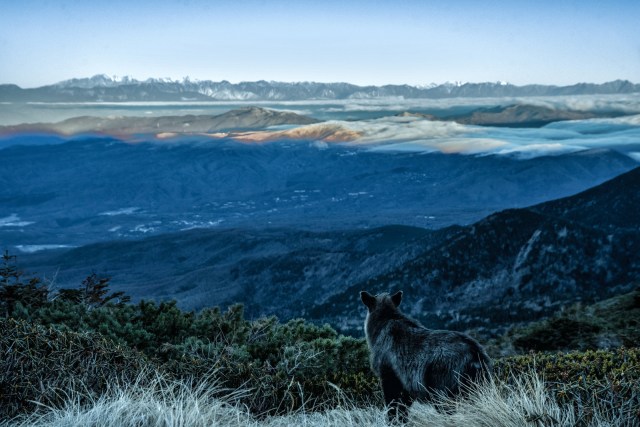
What started as supernatural encounter turned into a fun zoology lesson.
On 22 May, 80-year-old office worker Eiji Okamoto was out enjoying that natural scenery of Yanaizu Kokuzoson, a Buddhist temple in the mountains outside Ishinomaki City, Miyagi Prefecture.
On his way back to the parking lot, Okamoto felt a presence behind him, turning around he saw a very unusual animal standing 30 meters away and took the following photo.
もののけ姫はこうした例を参考にしたんだと思われる
— stonehead (@hogehoge1192) June 5, 2021
カモシカ、四つ目? 1本角! 石巻の岡本さん撮影 | 河北新報オンラインニュース
https://t.co/4ZcxD2hwrO pic.twitter.com/pA96xfP6x4
This photo, which appears to show a four-eyed goat, is shocking for obvious reasons. “I thought it was a sign from God,” Okamoto told the local news, who determined that the image was not doctored and because of the horn and fur, it can only be a single animal rather than two juxtaposed with each other.
Luckily the Tohoku Wildlife Conservation and Management Center in nearby Sendai City had a perfectly reasonable explanation for it. This animal is a Japanese serow, a type of goat found in many parts of the country.
A notable feature of these majestic beasts are their subocular glands which secrete a substance that the goats use to mark their territory by rubbing on rocks or trees. The goat in this photograph apparently hasn’t been doing enough marking because its glands have swollen to such a size and sheen that they resemble an extra pair of eyeballs.
▼ Such swelling is rare but not too uncommon. Here’s another “four-eyed” serow spotted in Gunma Prefecture back in 2012.
In each case, some more animal savvy viewers knew all about serow glands beforehand but still expressed surprise at just how eye-like they can become.
“I’d totally be scared if I saw that outdoors….”
“Wow! I thought there really were four eyes!”
“Gross.”
“Yup I knew about that, but I can certainly see how you would think they’re eyes.”
“The goat Ashitaka rode in Princess Mononoke is based on these, or maybe it was the god at the end.”
“That’s a Japanese serow. They’re endangered.”
These animals are not endangered, but they are considered a national symbol and thus are a protected species. So anyone who encounters one should resist the urge to run over and give its fake eyes a good squeezing, or else face both the legal and hygienic ramifications.
Source: Kahoku Shimbun
Top image: Pakutaso
● Want to hear about SoraNews24’s latest articles as soon as they’re published? Follow us on Facebook and Twitter!

No hay comentarios:
Publicar un comentario